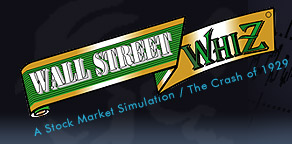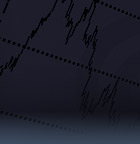During the Crash of 1929, many people survived using sound investment principles. Wall Street Whiz is a reenactment of this monumental event. Wall Street possesses many characteristics of a story, allowing students to easily follow the events of the simulation. During the Wall Street Whiz simulation, students will track twelve leading companies of the period.
The program starts with a history of Wall Street and the elementary beginning of stocks and investment. The student workbook also reviews basic terms and principles of economics along with all a student need to know to successfully participate in the simulation. Students can review information about the companies in the simulation using the "Company Prospectus" to gain an understanding of the history, products and services provided by each company. |




